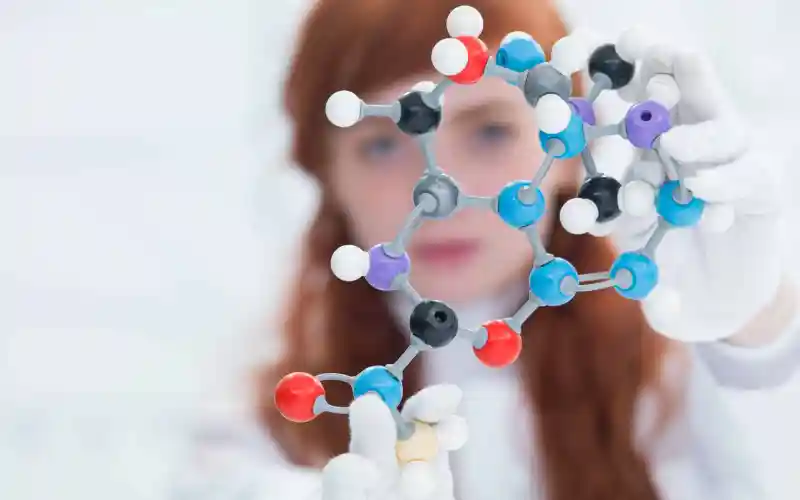Connect with us
Published
2 months agoon

The psychedelic drug DMT may be an effective treatment for depression, according to the results of a recently published study. The research also found that the intensity of a person’s psychedelic experience could be linked to the psychological benefits of the treatment.
DMT (N,N-Dimethyltryptamine) is a psychedelic that can be found naturally in some plants and animals, including humans and the Sonoran Desert toad. When ingested or inhaled, the compound can produce powerful but brief psychedelic experiences characterized in part by visual and auditory hallucinations.
Previous research has shown that psychedelics such as LSD and psilocybin show promise as treatments for mental health conditions including depression, anxiety, post-traumatic stress disorder and substance misuse disorders. However, the psychedelic effects of the drugs can last as long as eight hours or more, making therapeutic use of the compounds challenging.
As a result, some researchers are focusing on DMT as a mental health treatment because of the quick onset and short duration of the drug’s psychedelic effects. In a study published this month by Nature Scientific Reports, researchers explored the effect that DMT had on the mental health of study participants.
“I have been doing research with the psychedelic compound DMT for quite some years now, and we were wondering whether DMT has the same therapeutic possibilities as psilocybin and LSD,” lead author Chris Timmermann, the head of DMT Research Group at the Centre for Psychedelic Research at Imperial College London, told PsyPost about the new study. “So we set out to start a preliminary investigation into this by measuring scores of depression, anxiety and wellbeing before and after administration of DMT and placebo to healthy volunteers participating in our studies.”
The study was based on data from two separate studies involving 30 participants with previous experience with psychedelics. One study involved a placebo-controlled trial, while the other was a prospective sample analysis.
In the placebo-controlled study, 13 participants received DMT and a placebo in a fixed order during sessions held one week apart. By spacing out the treatments, researchers were able to observe changes that could be attributed to DMT by comparing outcomes following placebo and DMT sessions.
The prospective sample included 25 participants who completed a more complex study protocol that included EEG and fMRI imaging to record the neurological effects of DMT. The research used a pseudo-balanced order to administer DMT and placebo over four dosing sessions on two separate days spaced two weeks apart.
An analysis of the data from both studies showed that participants had a significant reduction in depression symptoms following the administration of DMT, suggesting that the drug might have potential as a quick-acting treatment with therapeutic effects on mood. The study also showed that the intensity of the psychedelic experience with DMT was linked to improvements in mental health.
“In a similar way to psilocybin and LSD, DMT was able to lower scores of depression symptoms in healthy volunteers,” said Timmermann. “Furthermore, we found that the scores of ‘peak’ experiences induced by DMT were correlated with reductions in symptoms of depression and anxiety. This means that DMT may have therapeutic potential and that the same experiential mechanism (the trip) is at play as with other psychedelics.”
The study showed a less definitive impact on other mental health conditions following the administration of DMT. Researchers observed reductions in anxiety, but the improvement did not rise to the level of being statistically significant, suggesting that DMT might have anxiolytic effects that warrant further investigation. Similar improvements in nature-relatedness and gratitude were also detected, but the changes were not statistically significant when adjusted for multiple comparisons. The study did not reveal significant changes in well-being, optimism, or meaning in life.
“We didn’t find any improvements in wellbeing in this healthy population after DMT compared to placebo,” Timmermann said. “This has to do with so-called ‘ceiling effects,’ when participants display already high scores of wellbeing before they are administered with DMT, so there is little room to observe a change.”
Although the results are promising, the researchers warned against drawing broad conclusions from the study. They note that the differences between the two original studies used for the research, the variability in DMT dosing and the participants’ previous experience with psychedelics prevent making generalizations based on the findings of the new study.
The researchers’ ultimate goal is “to understand to what extent we can use DMT safely for therapeutic purposes,” Timmermann explained. “Many outstanding questions remain here but the most important pertains [to] how DMT is delivered. We know now that DMT can be administered in a flexible way, as shown in our previous study, therefore we need to understand the right way in which to best administer the compound.”


Study Reveals State Cannabis Legalization Lowers Immigrant Deportation


DEA Challenges Bid To Use Psilocybin Under ‘Right To Try’ Legislation


Vegans Rejoice as Farmers Switch from Chickens to Hemp


Louisiana Legislative Committee Unanimously Passes Adult-Use Cannabis Framework Bill


Louisiana House Bill to Regulate Hemp Products Advances Along With Senate Bill to Ban


Cresco Labs Workers Reportedly De-Unionize
